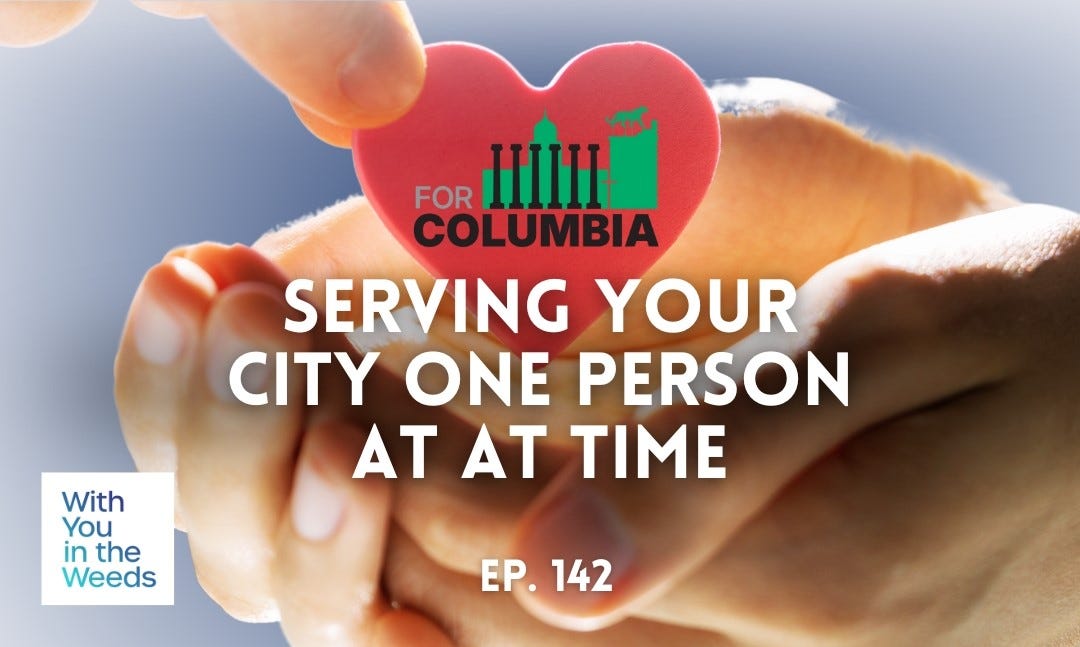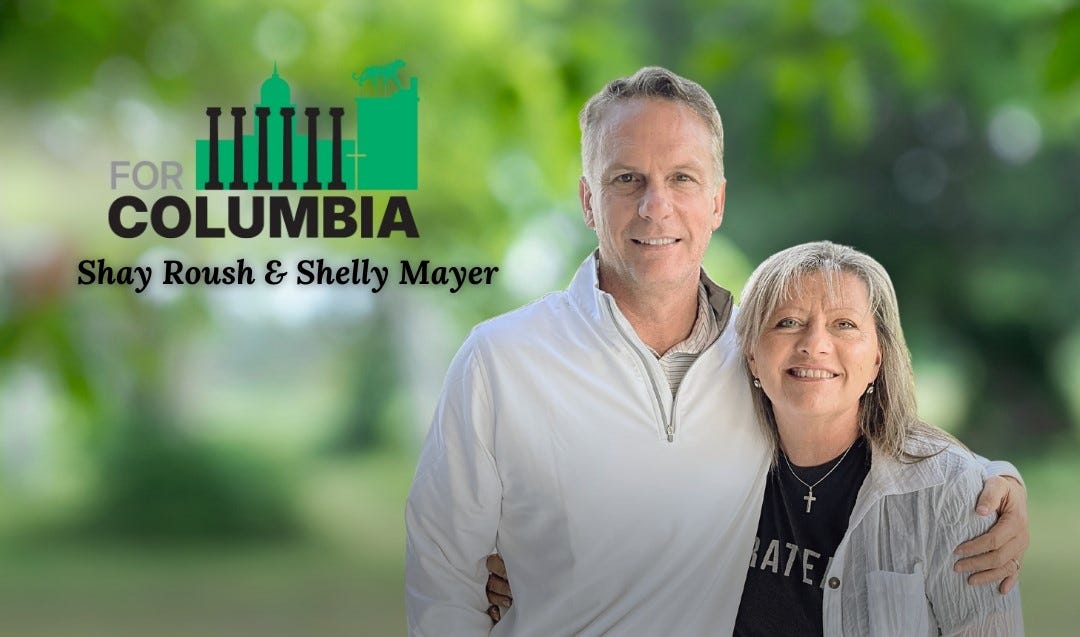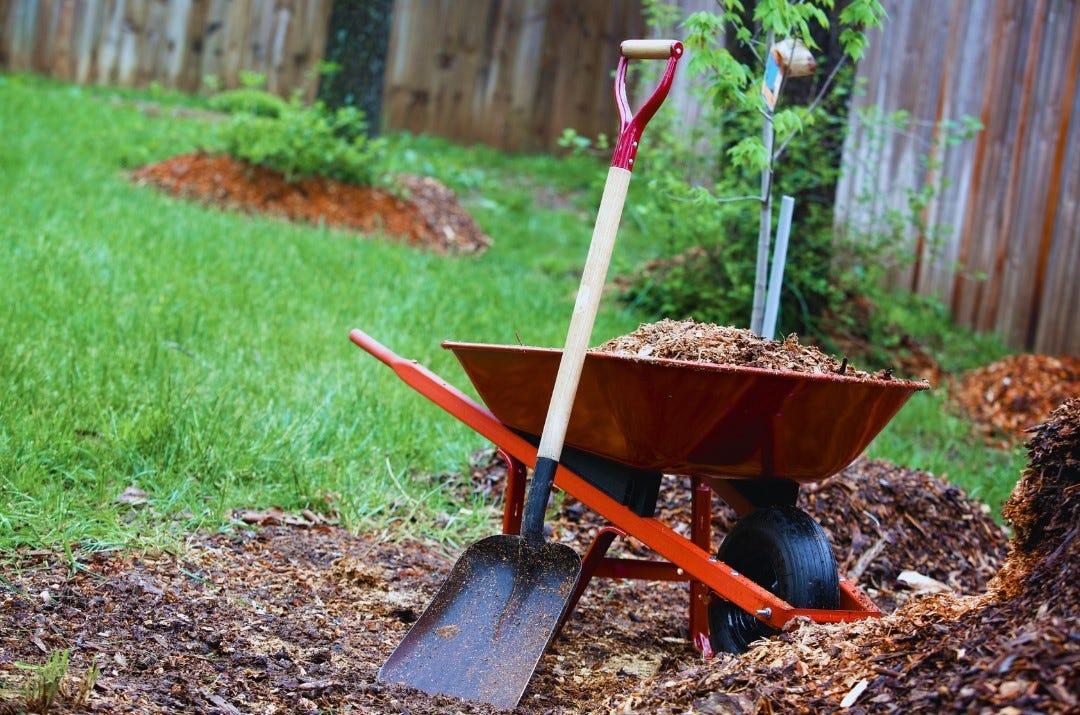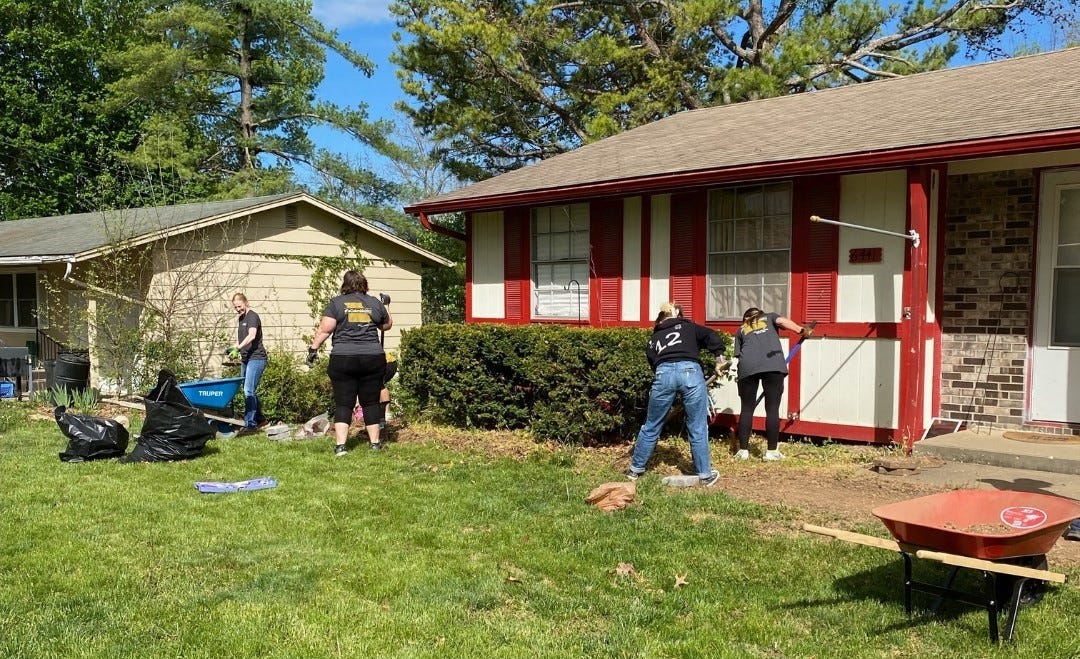Serving Your City One Person at a Time
Can one day change a city for the better?
Most ministries start out with one or two passionate people who are dedicated to a specific cause. A dozen people all working for a specific cause can have a lot of impact. But something special happens when 100 or even 1000 people work together for the same cause.
In the next episode of our ongoing series, Loving Your Neighbor as Yourself, Shay sits down with Shelly Mayer, Care Ministry Director at The Crossing, to talk about ForColumbia, the incredible one-day serving event that unites churches all over the city of Columbia, MO, as they work side-by-side to live out the gospel and serve the community.
You’ll hear about:
The purpose and mission of ForColumbia
What happens when churches work together for the community
Stories of people who found hope and help through ForColumbia
The types of care ministries and support groups offered by The Crossing
Loving your neighbor as yourself may not be an easy task, but when you link arms with others on the same mission, you can change a city, one person and one day at a time.
Highlights of Shay’s Conversation with Shelly
Shay: As we answer the call to love our neighbor as ourselves, and in light of the parable of the Good Samaritan, it’s important to ask, “Who is my neighbor?” Many times your neighbor is a person in your community. But when you think of the needs in your community – from the homeless to the elderly to veterans – it can be overwhelming to know where to begin.
Today I’m interviewing Shelly Mayer, who has worked with me for many years overseeing the care ministry at The Crossing. One of the events that Shelly and her team coordinate once a year is a project called ForColumbia, which I think embodies Jesus’ teaching in an impactful way. Shelly, welcome to the podcast. Can you tell us what ForColumbia is, in a nutshell?
Shelly: ForColumbia is an effort by Christian churches in Columbia to partner together to encourage people to love and serve their neighbors. We have different ways of worshipping, some differences in theology, but we all agree that God calls us to love others.
The beauty of ForColumbia is that it's an easy yet very practical and powerful way to get together with other believers outside of your own church, live out your faith, and have an impact in your community. The idea behind it was to give people a tangible way to serve and love their neighbors together so that they don’t feel like it all rests on them.
Shay: How many volunteers and how many churches are involved, and what's that look like on serving day?
Shelly: We just finished up our 11th year of serving this past spring and we had 55 churches. I think we ended up with about 2100 volunteers. That doesn't include children. Families bring elementary-aged kids to serve alongside them, which I think is super cool. That's another few hundred.
Shay: That is unbelievable. How did this begin? Where'd this idea come from?
Shelly: I wasn't involved the first year. I've done this for 10 of 11 years. After that first year, the churches that participated said, "We should do this again," and the person who organized it wasn’t interested in doing it again - because it’s so much work! So that's when I came in, and I've been doing it ever since.
My understanding of how it began is that there were a handful of really committed Christians here in the city who wanted to see churches have a show of unity in our culture. There were 11 churches involved that first year who got together, did the work, identified the serving sites and invited people to participate and thought, "Well, let's give this a shot, and if it goes poorly, we won't do it again."
You started out earlier by saying that the list of needs is endless. But if someone is willing to do the work of identifying those needs and lets people know the location and brings all the tools or materials, people are very responsive to that, and it becomes a meaningful experience both for the volunteer and the recipient.
Shay: I know churches in other cities have done this kind of thing before. It demonstrates to non-believers in the community that Christians really do care for those around us. They may not agree with our message. But it’s powerful for them to see Christians coming together in unity and serving their neighbor and wanting the city that they live in to flourish. Is it hard to get other churches and pastors on board?
Shelly: Usually pastors are very excited to be a part of it. We’re called to love God with all our heart, soul, mind, and strength, and then to love others as ourselves. We are wanting pastors to encourage their congregation to do what God is calling them to do anyway.
We’re called to love God with all our heart, soul, mind, and strength, and then to love others as ourselves. We are wanting pastors to encourage their congregation to do what God is calling them to do anyway.
We do the hard work of preparing those opportunities so it’s easy for others to join in and make an impact for one day. That said, there are plenty of people doing more work outside of that one day to plan on that. And many of the projects go beyond one day - in fact, some volunteers continue for the entire year.
Shay: Tell me about some of the projects that people do all over the city and how you identify these projects through the year.
Shelly: We look for work that can be done by highly motivated, largely unskilled workers. We do an awful lot of landscaping and brush clearing. We find homeowners who are older or who are dealing with chronic health issues, who don't have the energy to do yard work. Something as simple as clearing honeysuckle, spreading mulch, or planting some flowers can have a really positive impact for a homeowner. We also do landscaping at parks and schools.
We have people knitting and crocheting and then donating the things they make. We have people making dozens of freezer meals and dropping them off at people’s homes. We have a prayer warrior team praying for requests that come in as well as for the safety of all the workers. We have skilled workers who can paint or fix a fence or a gutter. Whatever skill you have, we can find a way to use it.
We serve three significant venues. We work in public places, like parks and schools. We also serve nonprofits because they’re often running on a tight budget or lack volunteers. And then we serve people in their private homes.
Shay: Can you share a story with me of someone whose life was touched by ForColumbia?
Shelly: There's one that stands out to me because from the beginning, ForColumbia has tried to be a single day effort. But the longer we've done this, the more we've run into people whose homes need so much more than you could do in a single day. Thankfully, we have people who have the skills and the time and the desire to actually want to do that work.
In this particular case, we helped a woman who lived with her mother after her father died. She tried to help her mother, but the house continued to have problems. So rather than living in a paid-for home, they decided to move out and rent somewhere. Then her mom died from COVID. In addition to losing her mother, she lost half her income and could no longer afford rent. She wanted to move back into the home that had been left sitting for three years.
The damage that had occurred in that three years was so significant that the house was unlivable. Originally her request was to fix the roof and the damage that had been caused by a large hole in the roof. That on its own would have been more than one day of serving, but it turned out there were many other problems, so over the course of several months, we had many volunteers helping her.
We arranged to have the work finished on the day of ForColumbia. We had people working inside and outside her house to get everything done. I remember she had tears in her eyes and was talking about how we had changed her life. Not just from the work that got done, but from the relationships that developed, particularly with the workers who were there for months in her home working side by side with her.
Shay: It’s truly life-changing. Shifting gears a little bit, can you tell us about the different care ministries and teams and volunteers that you oversee here at The Crossing?
Shelly: The care ministry has grown so much within the church. When I took it over 17 years ago, we had maybe four or five teams. They were teams of volunteers who are willing to do practical things, like making meals, helping with funerals, and meeting the practical needs of people who were going through an acute crisis, like surgery or other health issue.
As years have passed, we've found that there are so many people out there that are hurting in different ways and feel isolated and alone. So we’ve expanded our ministries to include Divorce Care, Grief Share, One-to-One Care, Single Moms, Cancer Care, and more.
Two that stand out to me are the Prayer Shawl ministry, where we make lap blankets that we can give to someone who is going through a hard time. Each blanket is prayed over and includes a note. And then we have the Card Writing team who takes the time to write handwritten notes to people who need a little bit of encouragement.
Shay: What incredible ways to reach out. Shelly, I appreciate you. Thanks for all that you do. My prayer is that every church would have a ‘Shelly’ who would love and care for people the way that you do. Thank you so much for being on with me today.
Recommended Resources
ForColumbia - Serving the City, Loving Our Neighbors
Looking for a place to serve? The Crossing has all kinds of Care Serving Teams.
Looking for support? The Crossing has Care Groups that meet every need.






